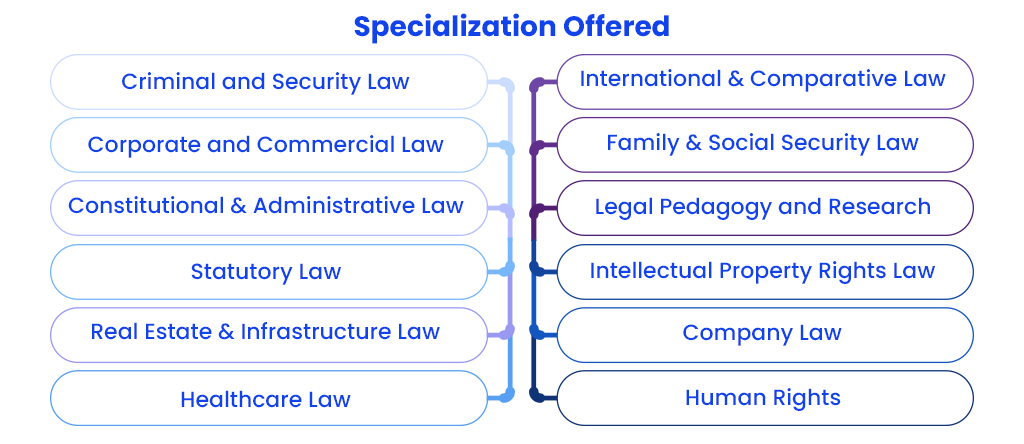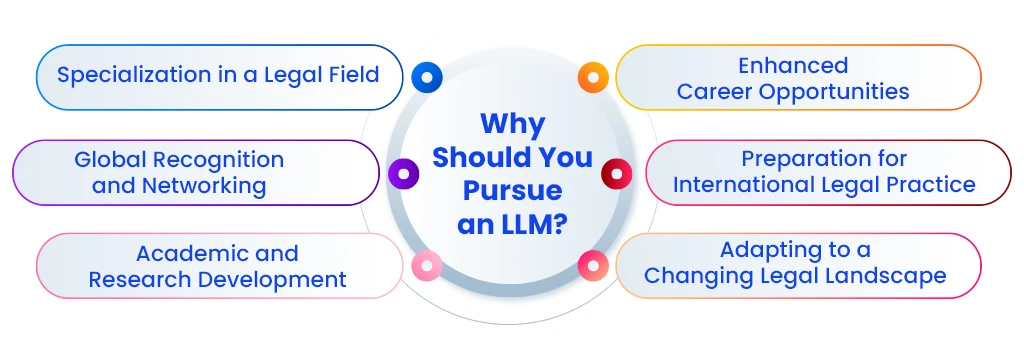Expert Interviews
- University Reviews
- Career Guide
 Video Counseling
Video CounselingImportant Facts
- Ask any Question - CV Forum

LLM Syllabus and Subject List 2026 (Specialization-Wise)
Sonika Jan 22, 2026 1.4K Reads

Professionals in search of knowledge and experience to their expertise in certain fields, consisting of corporate regulation, human rights, or global law, may enjoy the advanced postgraduate diploma known as the Master of Laws (LLM). The LLM designed for law graduates or practicing attorneys gives college students a worldwide perspective on intricate legal matters and develops their studies, critical analysis, and problem-solving skills. It allows advancing one's profession in legal exercise, academia, or policymaking. Coursework and a dissertation are often combined in packages, allowing students to actively participate in new legal trends and develop the field.
About LLM
For law graduates and legal experts seeking to increase their knowledge and proficiency in certain legal fields, the Master of Laws (LLM) is a globally recognized postgraduate degree. Students can further explore specialized regions including company governance, intellectual property, environmental law, corporate law, and human rights with this master’s degree. The LLM fosters the improvement of essential thinking, analytical, and research skills necessary for addressing complicated legal issues with the aid of offering a more focused curriculum.
Many LLM applications include a strong emphasis on a global attitude, which makes them particularly beneficial for people who work in international legal settings. To allow students to independently look into cutting-edge legal topics, the degree usually consists of coursework and a research dissertation. To connect ideas with practical applications, some colleges also include experiential additives like internships or moot courts.
Numerous employment alternatives can become available to you with an LLM. Graduates can work as in-residence consultants for agencies, legal firms, worldwide firms, or academia. Since the diploma frequently satisfies the instructional necessities for training law in several nations, it's also a stepping stone for people trying to pass to every other country. In the give up, the LLM offers solicitors the data and competencies they need to successfully negotiate and affect the changing legal environment.
|
Working Professionals Also Search |
|
|
LLM In International Business and Finance Law Blended Learning |
|
Specializations offered under LLM Program
LLM is a degree that has one of the vast syllabi. You never get to learn everything in a single go. With time, you get to experience new things and face more challenges throughout life that will help you to learn new things in this legal field. Universities offer various Specializations but not all universities offer every specialization. Before choosing any specialization, kindly think hard before you take this decision as this is a one-time decision that will be with you all the time throughout your life.

|
Top Specializations offered under LLM program |
|
|
|
|
|
|
|
|
|
|
|
|
|
|
|
|
|
LLM Syllabus Specialization-Wise
LLM in every specialization has its different subject, topic, and syllabus to teach. Also, the syllabus offered by one university may vary from the subjects offered by another university for any particular subject. Additionally, the depth of the syllabus may also vary from university to university. Let’s explore the syllabus offered in various specializations under LLM.
Let’s explore the specializations that are offered by different universities in India:
|
Specializations |
Syllabus/Subjects |
|
International and Comparative Law |
|
|
Corporate and Commercial Law |
|
|
Criminal and Security Law |
|
|
Family and Social Security Law |
|
|
Constitutional and Administrative Law |
|
|
Legal Pedagogy and Research |
|
|
Company Law |
|
|
Statutory Law |
|
|
Intellectual Property Rights Law |
|
|
Real Estate and Infrastructure Law |
|
|
Healthcare Law |
|
|
Corporate Law |
|
|
Labour law |
|
|
Human Rights |
|
|
Business Law |
|
|
Environmental Law |
|
|
Banking Law |
|
Top Universities offering LLM Programs
Multiple universities are there that are offering LLM courses in various specializations. These universities focus majorly on the student's intellect development and ensure that the student gets the knowledge as much as the students required to have a better future. Let’s see which Universities or Law schools are there that offer the best LLM degree in India.
| Top Universities offering LLM Programs | |
|
Dr BR Ambedkar College of Law |
Banaras Hindu University |
|
Lucknow University |
National Law School of India University (NLSUI) |
|
National Law University, Delhi |
UPES, Dehradun |
|
Lovely Professional University |
Symbiosis Law School International, Pune |
|
NLU, Kolkata |
National Law School of India University, Banglore |
|
Chandigarh University |
Shoolini University |
List of Specialization offered by different universities/colleges under a 2-year LLM program:
|
Top colleges offering 2-Year LLM program |
|
|
Universities/Colleges |
Specializations |
|
Lucknow University |
|
|
Banaras Hindu University |
|
|
Chandigarh University |
|
|
Shoolini University |
|
|
National Law School of India University (NLSUI) |
|
NLSUI offers a total of 71 specializations under the LLM 2-year program from which the top 15 are mentioned above in the table.
Specialization offered by top universities/colleges under 1-year LLM program
|
Top colleges offering 1-Year LLM program |
|
|
Universities/Colleges |
Specializations |
|
National Law University, Delhi |
|
|
Lovely Professional University |
|
|
Symbiosis Law School International, Pune |
|
|
NLU, Kolkata |
|
|
UPES |
|
|
BHU |
|
Specializations and syllabus at Jindal Global Law School (1-year Blended Learning Program)
|
Specializations and syllabus at Jindal Global Law School (Blended Learning Program) |
|
|
Specializations |
Syllabus/Subjects |
|
Corporate & Financial Law |
|
|
AI and Emerging Technologies |
|
|
Intellectual Property & Technology Law |
|
|
Dispute Resolution |
|
Why should you pursue an LLM?

- Specialization in a Legal Field: You can focus on a particular subject or specialization of law, inclusive of business law, environmental law, or international law, with an LLM. Your expertise is advanced by this specialization, which additionally offers you the skills to with a bit of luck precisely manage tough legal challenges and increase your competitiveness in specialized legal markets.
- Enhanced Career Opportunities: Advanced positions in prestigious legal corporations, worldwide establishments, or international corporations may also become available to people with an LLM. LLM graduates are frequently seen by employers as extremely informed and proficient professionals, which improves your possibilities of advancing into leadership roles or taking on work in other legal fields.
- Global Recognition and Networking: Gaining an international reputation and networking possibilities with classmates, instructors, and legal professionals are two benefits of pursuing an LLM at a reputable college or university. In addition to increasing your expertise in other legal systems, this international exposure gives you access to a community that can be quite beneficial to your professional improvement.
- Preparation for International Legal Practice: An LLM might help in bridging the distance between several legal systems in case you want to practice law globally. You can grow your practice internationally because some programs meet the requirements for bar examinations in international locations just like the US.
- Academic and Research Development: You can also interact deeply with legal issues and new trends due to the LLM program's emphasis on advanced studies and critical thinking skills. It provides the analytical skills necessary to generate large research and acts as a foundation for individuals hoping to pursue careers in academia or legal scholarship.
- Adapting to a Changing Legal Landscape: With new issues arising in fields like technology, human rights, and environmental sustainability, the legal career is constantly changing. An LLM ensures your relevance in a world that is changing rapidly by providing you with the most updated facts and sources to stay ahead.
Who can pursue an LLM?
- Law Graduates: An LLM can be pursued by anybody having a Bachelor of Laws (LLB) or an equivalent undergraduate legal degree. Their simple legal knowledge is reinforced by this certification, which also permits them to be recognized in certain legal fields.
- Legal Professionals: An LLM may be pursued by advocates, practicing legal professionals, or legal experts who need to develop their careers, concentrate on a particular domain, or improve their expertise. It gives them the chance to enhance their skills and tackle difficult legal issues.
- International Law Aspirants: An LLM might help people who want to practice law in lots of jurisdictions or are seeking possibilities in international law. It fills up the gaps among one-of-a-kind legal systems and frequently satisfies the educational requirements for bar examinations in several countries.
- Academics and Researchers: To learn advanced research skills and increase their knowledge of legal theories and ideas—each of which is crucial for scholarly contributions—individuals who are interested in a profession in academia or legal studies might pursue an LLM.
- Career Changers: To acquire the required legal understanding, knowledge, and certifications, specialists from similar fields—consisting of trade, policymaking, or international relations—who want to move into the legal place may pursue an LLM.
Conclusion
LLM is a master’s degree in law field. It stands for Master’s in Law. this is a 2-year master’s program that allows you to learn about the understanding of legal processes and other aspects. An individual who wants to deep dive into a specific subject or any specialization, then only they should pursue an LLM degree. Also, if you are interested in learning and understanding of the legal structure and law, then you can pursue an LLM but you can only pursue this degree if you have completed your LLB degree. Many universities in India offer LLM degrees in various specializations and each the specialization has its syllabus, all different from one another. Additionally, no two universities offer the same syllabus, as it varies from university to university. There are more than 20 specializations under LLM from which you can choose and find the best profession or position in the legal field.
FAQs (Frequently Asked Questions)
The basic requirement to enroll in an LLM program is that a student need to have completed their LLB degree. Additionally, students have to quality certain exams like CLAT, AILET, CUET, LSAT, and more. You need to score good marks to get a good law school.
Well, the last day to register for CLAT 2024 is gone, it was on 15 October 2024. Now, the exam will take place on 1 December 2024.
Well, it completely depends on the individual, if an individual is interested in any subject then the degree will feel like an easy one. But if you are doing this degree for some reason other than your interest, it may feel a bit difficult.
Many universities are offering LLM degrees in India. It includes Dr BR Ambedkar College of Law, Banaras Hindu University, Lucknow University, National Law School of India University (NLSUI), National Law University, UPES, Lovely Professional University, Symbiosis Law School International, Pune, NLU, National Law School of India University, Chandigarh University, Shoolini University, and more.

By Sonika
3 Years of experience/ academic writer/ freelance writer
An academic writing expert with an experience of 4 years.
Every query is essential.
Our team of experts, or experienced individuals, will answer it within 24 hours.
Recommended for you
Tired of dealing with call centers!
Get a professional advisor for Career!
LIFETIME FREE
Rs.1499(Exclusive offer for today)

Pooja
MBA 7 yrs exp

Sarthak
M.Com 4 yrs exp

Kapil Gupta
MCA 5 yrs exp
or



Career Finder
(Career Suitability Test)
Explore and Find out your Most Suitable Career Path. Get Started with our Career Finder Tool Now!
ROI Calculator
Find out the expected salary, costs, and ROI of your chosen online university with our free calculator.

